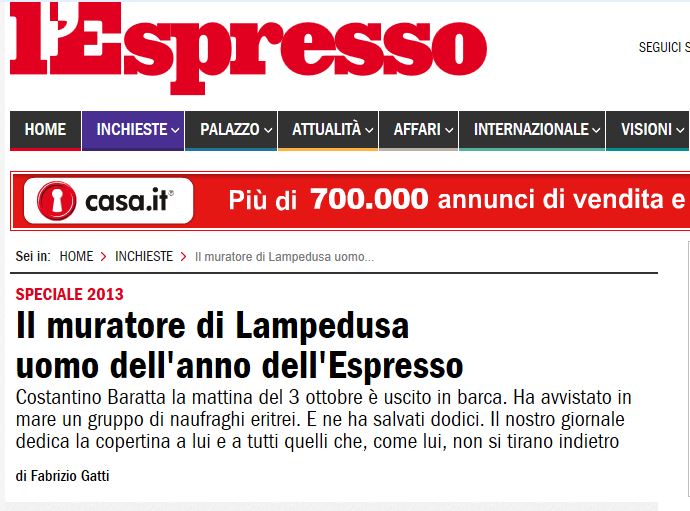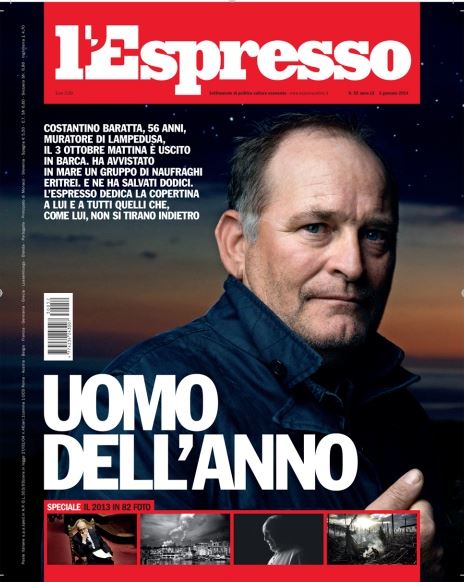Costantino Baratta, 56, a stonemason in Lampedusa, is Italian news magazine L’Espresso’s Man of the Year
An excerpt from the article, in translation:
THE STONEMASON OF LAMPEDUSA – L’ESPRESSO’S MAN OF THE YEAR
On the morning of 3 October, Costantino Baratta took his boat out and saw a group of shipwrecked Eritreans. And he saved 12 of them from drowning. We dedicate our cover to him and to all those who, like him, did not hold back.
by Fabrizio Gatti
This man is our human being of the year. On the morning of October 3, Costantino Baratta, 56, a mason, took his boat out from the port of Lampedusa and entered the chronicle of a tragedy that has marked 2013 indelibly. Kneeling in a small hull of 5.5 metres, Costantino pulled 11 boys and a girl out of water covered in the rainbow hues of naphtha. Because they were limp with exhaustion and near death, he pulled them out by the seat of their trousers, and where they were completely naked, he gripped them by skin greasy with fuel and laid them at his feet.
Those 12 Eritrean refugees were the last fished out alive, from the wreckage of the vessel which had brought them from Libya, a few hundred metres from the cliffs of Cala Madonna. Costantino’s act shifted the balance to 153 survivors and 366 dead, including 16 children, who drowned trying to escape from the iron fist of President Isaias Afewerki, African dictator and dear friend of the Italian government.
L’Espresso has dedicated the cover of the year to Costantino Baratta and to all those with him that morning, who like others on so many other mornings in the last twenty years, have found themselves in the sea; and to the people of Lampedusa, the refugees, rescuers and shipwrecked, survivors and drowned, and those who were saved along this front-line of Europe.
(…)
“That day I woke up at around six or quarter past,” Baratta says, “because the owner of the boat, Onder Vecchi, a pensioner, and I had decided to go out fishing. We were not working at the time because it was still the tourism season. We wanted to catch a couple of small tuna, dentex or bream. As soon as we left the port, which must have been around seven or five minutes past, we saw a patrol boat and other boats hard by it. I said to Onder, let’s go closer and see what is happening.”
Just then, the little boat with the two friends on board became the salvation for survivors who had been pulled away by the current from the main rescuers. “When we approached those other boats, we saw people in the water who were waving their arms and shouting,” Baratta says. “We began to pull them aboard, and in 15 to 20 minutes had pulled up eight or nine. The boat was already unsteady at that point. But then from a fishing-boat we heard a woman scream at us, who we later saw was Grazia, who is from Catania but has a shop in Lampedua: “Hurry! Your boat is quicker to manouevre – go get the others who are still in the water.” We rescued another two. They were naked and covered in naphtha that made them as slippery as soaps. From the patrol boat they called out to us: “Rescue the living and leave the corpses.”
And that is how the body of Uam, a 24-year-old woman, already among the corpses, was brought back to the land of the living. “I thought that this was perhaps another dead one,” Costantino Baratta says. “She was floating with her arms open. We noticed that she moved her hand a little and then in a tiny strand of voice said, help me, help me. Onder exclaimed, it’s a girl. We approached her slowly. We held out our hands, but the girl did not react. She was already exhausted. I pulled her towards the ladder but there was no way she was going to be able to climb aboard. So I said to Onder: leave the tiller and come and help me. I can’t pull this one out alone as I did with the others. I grabbed one arm and Onder the other, and we pulled her out. She vomited naphtha; it’s toxic. I took a bottle of water and washed down her face. I gave her some water to drink and she vomited it out immediately along with more naphtha. I saw that she was all dirty, even her eyes. I took off my vest and soaked it in fresh water. I wiped her face and her hair. She was icy cold and I wrapped her in another vest, trying to warm her up a little, but I could see that she was in a very bad way.”
Costantino explains that, after the rescue, he wanted to meet Uam and the others he had rescued. He invited them to his home. He put at their disposal his telephone and computer so that they could get in touch with their relatives in Europe and their parents in Eritrea. Today, Uam is in Sweden; the others are in Germany and Rome – except for two, who are held in Lampedusa because they have accepted to testify against the organisers of the voyage,
“One evening, when it was dark, I heard the doorbell ring and there they were, all of them,” Baratta smiles. “Costantino, I am Robel, he said, and I am here with the others who you have saved. The nine of us have come here this evening. And so I told them to make themselves at home. I recognised them. They told me: you lifted me out by the trousers; you gave me a towel. A little bit in English, a little bit in Italian; we made ourselves understood. Now I am in touch with some of them on Facebook.”
In what language do you communicate? “Uam and the boys write in English. I use the computer to translate what they write. Then I write a reply and translate that into English and put it on Facebook. Uam says that she must return to Lampedusa to give me back the telephone which I gave to them. She says that she does not yet have her papers from Sweden. But when she does, she will return to visit me and my wife.”
Why has he done all this? “I don’t know,” he replies. “Maybe it’s something innate in island life. Or maybe it’s because I come from generations of emigrants. That makes us responsive to emigrants. All the Lampedusans have helped out in this.”
And how does he feel inside, having witnessed a shipwreck and helped in the rescue? “We all live it through in different ways. For a month or so I refused to go to work. I could do nothing but talk about the tragedy. Perhaps talking about it was good. But among the rescuers there are some who do not wish to speak at all. One of them, Domenico Colapinto, I know to be in the care of a psychologist because he can no longer go out to sea, and it is his work. He is a fisherman. I have written messages to him on Facebook: you must go on. Life goes on. I have seen that with the boys, when they begin talking after two or three days, then they feel better. The only regret that Onder and I have is how, that day, we went out fishing later. Had we gone half an hour earlier, we would have saved many more people. Our boat, with its outboard motor and low hull, was easier to manouevre than those of the rescuers. I often think about this. Every so often I look at the photographs of the tragedy.”
(…)
8 Comments Comment
Leave a Comment




http://espresso.repubblica.it/inchieste/2013/12/27/news/uomo-dell-anno-1.147295
Forsi dan veru haqqu Gieh ir-Republika, u mhux min halla n-nies jmutu minghajr ma jiehu decizjoni.
Muscat DID take a decision. He decided not to despatch the AFM’s patrol boat, even though it was only 60km away.
Instead, he despatched a spotter plane to shed a tiny life raft, condemning hundreds to death and hundreds to live with horrendous loss and nightmarish memories.
That includes the AFM members who had to watch as people drowned, knowing they weren’t authorised to rescue them.
Muscat then decided to make an even greater mockery of his mess by including the entire AFM contingent in the Republic day honours list.
And then we had Joey on October 11 procrastinating for four full hours before instructing AFM to head out to a stricken boat 280 miles away but neglected to order merchant ships which were within 27 miles from the boat to go ahead and assist the immigrants! This after Malta assumed responsibility for the rescue mission! The result? A loss of 270 lives! Shame.
Maybe he wanted to outdo Costantino Baratta?
Malta’s patrol boat was only 60km away that day.
Somebody should put a copy of L’Espresso on the prime minister’s desk at his office in the Auberge de Castille, with a note saying “Smell this coffee, can ya?”
A true Christian.
Ahna ma naghmlux bhal dan ghax ghandna Partit tal-Landi li jaghmel l-aktar hoss meta suppost joqghod kwiet u joqghod kwiet meta suppost qed jghin lill proxxmu. Viva l-Landi u L LANDIER li jsodd it-toqob.